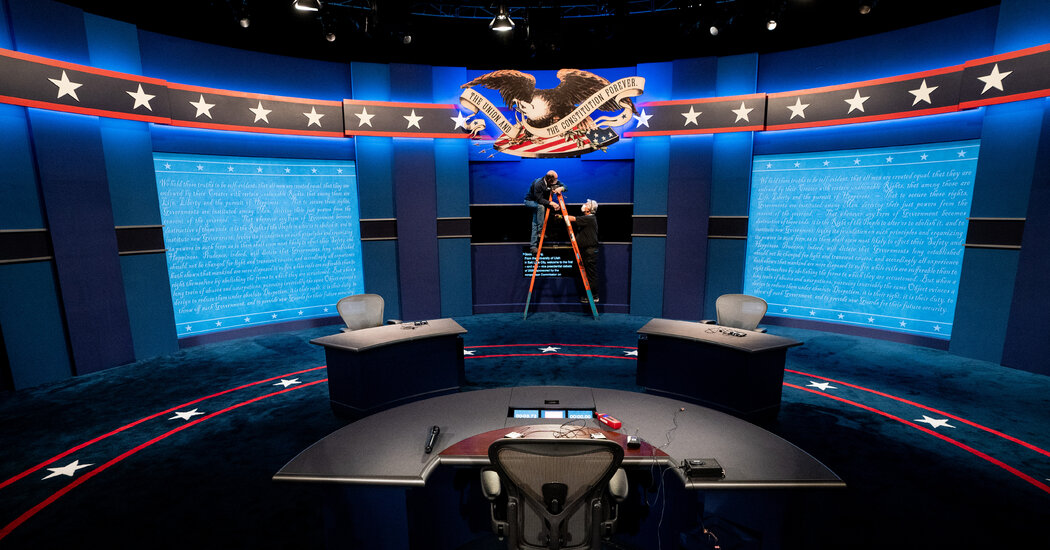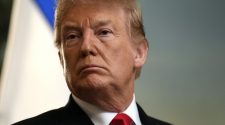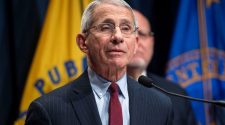[Follow our live vice presidential debate updates between Harris and Pence.]
-
The debate between Vice President Mike Pence and Senator Kamala Harris will begin at 9 p.m. Eastern on Wednesday and run for 90 minutes without commercial interruptions. This will be their only debate.
-
The Times will livestream the event, accompanied by analysis and fact-checking from our reporters. The debate will also be carried on networks including ABC, CBS, CNN, C-SPAN, Fox News, MSNBC, NBC and PBS.
-
Susan Page, the Washington bureau chief for USA Today, will moderate the debate, which will be held at the University of Utah in Salt Lake City.
A new campaign front on Covid-19
It is difficult to overstate how much this debate has been shaped by the Covid-19 pandemic, from President Trump’s hospitalization with the disease to the last-minute skirmish between the Biden and Trump camps over whether Mr. Pence — who has interacted with White House advisers who have since tested positive for the coronavirus — should stand behind a protective plexiglass screen.
Mr. Pence, as the head of the White House task force on the coronavirus, will presumably be pressed to account for the faltering White House response to a pandemic that has killed over 200,000 people in the United States. Since returning from the hospital, Mr. Trump has sought to recast the entire discussion on the pandemic, arguing that the virus is in fact not that serious and that Americans should continue to live their lives.
Will Mr. Pence carry Mr. Trump’s argument to Ms. Harris and the American public Wednesday night? Many polls suggest that it defies the fears of most Americans struggling to navigate the pandemic.
Mr. Pence is also likely to be pressed to defend Mr. Trump’s actions since his illness was diagnosed — leaving the hospital against the counsel of many medical professionals, minimizing the threat of the virus and dramatically removing his mask when he returned to the White House. The president has offered himself as evidence that Covid-19 can be beaten; does Mr. Pence agree with that?
For Mr. Pence, it’s not simply a matter of embracing an argument that the president thinks might help him win re-election. This is almost certainly Mr. Trump’s last campaign. At 61, Mr. Pence is looking at continuing his career in politics. How he handles those questions could end up defining him for a long time.
How does Harris finesse attacking Trump?
Vice-presidential candidates have only two things to accomplish in a debate: Defend the person at the top of your ticket. And attack the person at the top of the opposition ticket.
But that basic rule of thumb got a little more tricky for Ms. Harris. With Mr. Trump’s Covid-19 diagnosis and him just being back at the White House after three nights in a hospital, harsh attacks against an ailing president might be politically unwise. The Biden campaign pulled down its negative advertising attacking Mr. Trump as soon as he disclosed his diagnosis. Joseph R. Biden Jr. has stepped carefully in talking about the president.
Ms. Harris, a former prosecutor and a member of the Senate Judiciary Committee, has established her credentials as a tough interrogator with her questioning of officials like William P. Barr, the attorney general. She knows how to make a case. But can she attack Mr. Trump’s handling of the virus — which has come to define his presidency — without veering toward an overly personal attack on a president battling a potentially lethal disease?
It means threading a needle. Ms. Harris was an inconsistent debater during the Democratic primary — she had some good moments, and some not-so-good moments before she dropped out. She has never stepped onto this prominent a stage.
How does Harris handle going off script?
Ms. Harris, most often remembered for her “that little girl was me” debate moment with Mr. Biden during the primary, is talented at delivering the slashing-when-prepared debate lines. That is, after all, the same skill set that she developed as a prosecutor and that elevated her during Senate committee hearings to star status among Democrats as she has bore in on Republican witnesses.
To that end, Ms. Harris arrived in Salt Lake City last Friday — the same day Mr. Trump was checked into the hospital — to begin her on-the-ground debate preparations. Karen Dunn, who readied Senator Tim Kaine to debate against Mr. Pence four years ago, as well as Mrs. Clinton and Barack Obama for past Democratic presidential debates, is leading those efforts. The preparation has also included Rohini Kosoglu, Symone Sanders and Liz Allen. Pete Buttigieg, who has played the role of Mr. Pence in Ms. Harris’s preparations, was spotted in town as well.
But debates are not set pieces and Ms. Harris will have to defend not just her own record but also Mr. Biden’s — and no candidate can be prepared for every eventuality, no matter how many index cards she studies, especially in 2020.
“This time it will be about requiring some level of knowledge — if not mastery — of Joe’s record, the Vice President Mike Pence’s record, Trump’s record and then of course defending my own record,” Ms. Harris said on Hillary Clinton’s podcast last week. “So that’s different.’’
Notably, Mr. Biden has undertaken some public rehearsals for his debates, including two televised town halls. Ms. Harris has been mostly cloistered since joining the ticket. The debate will be, by far, the most freewheeling exchanges of her time as vice-presidential candidate.
How race and gender play
Mrs. Clinton, the only woman to serve as a major-party presidential nominee, warned Ms. Harris, in so many words, about the corrosive role that sexism will play onstage.
“You should also be prepared for the slights, the efforts to diminish you, you personally, you as a woman, who is about to be our next vice president,” Mrs. Clinton said on her podcast. “So I do think there will be a lot of maneuvering on the other side to try to put you in a box.”
Academic studies have shown that women face different barriers in terms of public perception, and Ms. Harris is not just a woman but also the first woman of color on a major-party ticket.
Jennifer Lawless, a professor of politics at the University of Virginia who has studied gender dynamics, said that women generally had to show they were capable of standing up to “being bullied” but that Ms. Harris faced an extra hurdle.
“Because she is also a woman of color, she also has to walk that ‘Don’t look too angry’ line,” Ms. Lawless said. “These are cliché. But they’re cliché because they’re true.”
The mild-mannered Mr. Pence is unlikely to bully or even directly broach any gendered lines the way Mr. Trump might. But the impact of audience perception remains.
For months, the Trump campaign has tried to raise doubts about Mr. Biden’s fitness while attempting to cast Ms. Harris as its true foil, the real — and more liberal — power center in a potential Biden White House.
“She symbolizes everything that ‘Make America Great Again’ wants to push back on by virtue of being a Black woman,” Ms. Lawless said.
Attack or defend?
In 2016, Mr. Pence had a clear three-step strategy every time his vice-presidential rival, Mr. Kaine, attacked Mr. Trump. He offered a quick defense of Mr. Trump (Step 1); moved quickly to talk about the aspirations of a Trump presidency (Step 2); and swung into an attack on the Democrats (Step 3).
But striking the balance between attack and defend could be a particular challenge for Mr. Pence this time.
For one thing, after four years, there’s more to defend. This would have been a much different debate nine months ago, when Mr. Pence could have talked about the humming economy, job growth and a generally confident electorate. Now, Mr. Pence is going to be talking about the pandemic, the failure so far of Congress and the White House to come up with a stimulus plan and an economy that has gone off the rails.
For another, Mr. Trump has not had much luck attacking Mr. Biden so far; the former vice president has proved an elusive target, certainly when compared with Mrs. Clinton. Perhaps Mr. Pence will have more success.
But he has a third task as well: attacking Ms. Harris. Mr. Trump’s efforts at portraying Ms. Harris as a stalking horse for more liberal policies, who would be the power behind a Biden presidency, has resonated with the right. But those voters were already with Mr. Trump. The task for Mr. Pence is to make them resonate with any remaining undecided voters.
A preview of 2024?
Almost every vice-presidential debate is about two elections at once: the current one and the one that will follow — because so many vice presidents, and vice-presidential candidates, eventually run for president. (A quick recent list: John Edwards, Joe Lieberman, George H.W. Bush, Al Gore and, of course, Mr. Biden.)
This face-off is especially significant because of how soon both Mr. Pence and Ms. Harris could be leading their parties, given the ages of Mr. Trump (74) and Mr. Biden (77) and the specter of the coronavirus, from which Mr. Trump continues to recover.
Mr. Biden has already talked about himself as a “bridge” to the next generation of Democratic leaders. If he wins, he will be enabling Ms. Harris to cross that bridge as the first among equals among Democrats vying for that leadership mantle.
Mr. Trump has evinced no interest in transitioning out of power or the spotlight, but Mr. Pence is widely believed to have presidential ambitions of his own. The former governor of Indiana has treated his vice presidency mostly as an exercise — often a difficult one — to maintain zero political daylight between himself and Mr. Trump. But plenty of other Republicans are already circling around the 2024 election and seeking the mantle of Trumpism; Senator Tom Cotton of Arkansas has been building his profile, and the former United Nations ambassador Nikki Haley was recently in New Hampshire.

















